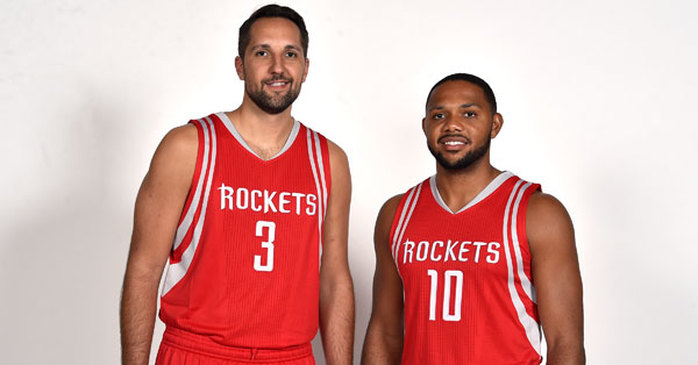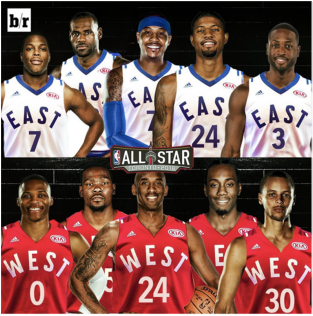
Houston's struggles were of no secrecy last year: despite featuring a pair of superstars in SG James Harden and C Dwight Howard -- as well as what initially looked to be a solid supporting cast -- the team limped its way to a 41-41 record, barely qualified for the playoffs as the eighth seed in the West, and were handily swept by the then-reigning champs, Golden State. What happened?
Well one blatant issue was defense. Especially for a team lauded for its elite defenders all over the court -- PG Patrick Beverley, SF Trevor Ariza, Howard -- the Rockets seriously struggled last year. At 106.5, the team surrendered the sixth most points per game in the league, and the five teams below them had an average of 22.6 wins over the course of the 82-game season. Conversely, the five teams who allowed the fewest points per game averaged 53.6 wins. In addition to winning championships, defense also wins games.
However, the one thing the Rockets did very well on defense, I must admit, is forcing turnovers. The team led the league with 10.0 steals per game, and tied for the league-lead in forced turnovers per game at 15.8. This in turn led to several fast-break points, as transition offense is at efficient as it gets in the sport of basketball.
But that's about the only sentence you'll ever see which has both the words 'efficient' and 'Rockets 2015-16 offense' in it (other than this one). While Houston jacked up 30.9 threes per game -- second in the league only to the Warriors -- only a mediocre 34.7% of them were good, checking in at 19th in the league. Indeed, the team struggled at being productive in the half-court and just never really got their set offense clicking all season, instead choosing to push the pace, which they were in fact seventh in the league in. It also didn't help that the Rockets themselves coughed up the ball 15.2 times per game last season, a figure good for top-five in the league.
But over the summer, GM Daryl Morey addressed the problem: he let the stagnant Dwight Howard and PG Ty Lawson go, and used the new found capspace to add a pair of long-range gunners in PF Ryan Anderson and SG Eric Gordon. The Gordon move in particular puzzled many: didn't Houston already have a shooting guard, a certain James Harden?
The front office and the coaching staff were trying something new: shift their superstar over to point guard. After all, it was time for a change.
And the change was successful. Now, four members of the Houston starting five -- Harden, Gordon, Ariza, and Anderson -- combine for 12.1 made threes per game; those four players alone would place second in the league for team threes per game. But instead, the entire Rockets team combines for 14 threes per game thus far this season, which is tops in the league -- even above Golden State (12.1) and Cleveland (13.3).
But as we saw last year, the key with threes lies not in the volume, but in the efficiency. And at 37.8% -- fourth in the league -- the Rockets have found their key. That figure, in fact, is in large part thanks to their new additions: Gordon is connecting on 39.6% of his long-balls, while Anderson is hitting a blazing-hot 42.9%.
The Rockets aren't forcing nearly as many turnovers as they were last season, but the data indicates that that's actually because they are playing smarter, more conservative defense rather than going for steals. Indeed, their defensive rating rank is about the same thus far this season as it was last season, and this is without their anchor Dwight Howard (yeah, he is good for something, in fact). As of this moment, Houston is 13-7 (0.650) with the sixth best record in basketball and fourth in the Western Conference.
Meanwhile, James Harden is experiencing the best season of his career, averaging 28.3 points, 11.8 assists, 7.8 rebounds, 2.9 made threes, and 1.3 steals per game -- and all on a higher effective field goal percentage (efg%) than last season. Moving James Harden to point guard and letting Howard walk -- moves that both opened the door for Gordon and Anderson to enter the lineup and start knocking down threes -- were both quite the head-scratchers at the time, but now make for one of the league's most compelling turnaround success stories (even if the Rocket bench is still sub-par).
Well one blatant issue was defense. Especially for a team lauded for its elite defenders all over the court -- PG Patrick Beverley, SF Trevor Ariza, Howard -- the Rockets seriously struggled last year. At 106.5, the team surrendered the sixth most points per game in the league, and the five teams below them had an average of 22.6 wins over the course of the 82-game season. Conversely, the five teams who allowed the fewest points per game averaged 53.6 wins. In addition to winning championships, defense also wins games.
However, the one thing the Rockets did very well on defense, I must admit, is forcing turnovers. The team led the league with 10.0 steals per game, and tied for the league-lead in forced turnovers per game at 15.8. This in turn led to several fast-break points, as transition offense is at efficient as it gets in the sport of basketball.
But that's about the only sentence you'll ever see which has both the words 'efficient' and 'Rockets 2015-16 offense' in it (other than this one). While Houston jacked up 30.9 threes per game -- second in the league only to the Warriors -- only a mediocre 34.7% of them were good, checking in at 19th in the league. Indeed, the team struggled at being productive in the half-court and just never really got their set offense clicking all season, instead choosing to push the pace, which they were in fact seventh in the league in. It also didn't help that the Rockets themselves coughed up the ball 15.2 times per game last season, a figure good for top-five in the league.
But over the summer, GM Daryl Morey addressed the problem: he let the stagnant Dwight Howard and PG Ty Lawson go, and used the new found capspace to add a pair of long-range gunners in PF Ryan Anderson and SG Eric Gordon. The Gordon move in particular puzzled many: didn't Houston already have a shooting guard, a certain James Harden?
The front office and the coaching staff were trying something new: shift their superstar over to point guard. After all, it was time for a change.
And the change was successful. Now, four members of the Houston starting five -- Harden, Gordon, Ariza, and Anderson -- combine for 12.1 made threes per game; those four players alone would place second in the league for team threes per game. But instead, the entire Rockets team combines for 14 threes per game thus far this season, which is tops in the league -- even above Golden State (12.1) and Cleveland (13.3).
But as we saw last year, the key with threes lies not in the volume, but in the efficiency. And at 37.8% -- fourth in the league -- the Rockets have found their key. That figure, in fact, is in large part thanks to their new additions: Gordon is connecting on 39.6% of his long-balls, while Anderson is hitting a blazing-hot 42.9%.
The Rockets aren't forcing nearly as many turnovers as they were last season, but the data indicates that that's actually because they are playing smarter, more conservative defense rather than going for steals. Indeed, their defensive rating rank is about the same thus far this season as it was last season, and this is without their anchor Dwight Howard (yeah, he is good for something, in fact). As of this moment, Houston is 13-7 (0.650) with the sixth best record in basketball and fourth in the Western Conference.
Meanwhile, James Harden is experiencing the best season of his career, averaging 28.3 points, 11.8 assists, 7.8 rebounds, 2.9 made threes, and 1.3 steals per game -- and all on a higher effective field goal percentage (efg%) than last season. Moving James Harden to point guard and letting Howard walk -- moves that both opened the door for Gordon and Anderson to enter the lineup and start knocking down threes -- were both quite the head-scratchers at the time, but now make for one of the league's most compelling turnaround success stories (even if the Rocket bench is still sub-par).


 RSS Feed
RSS Feed